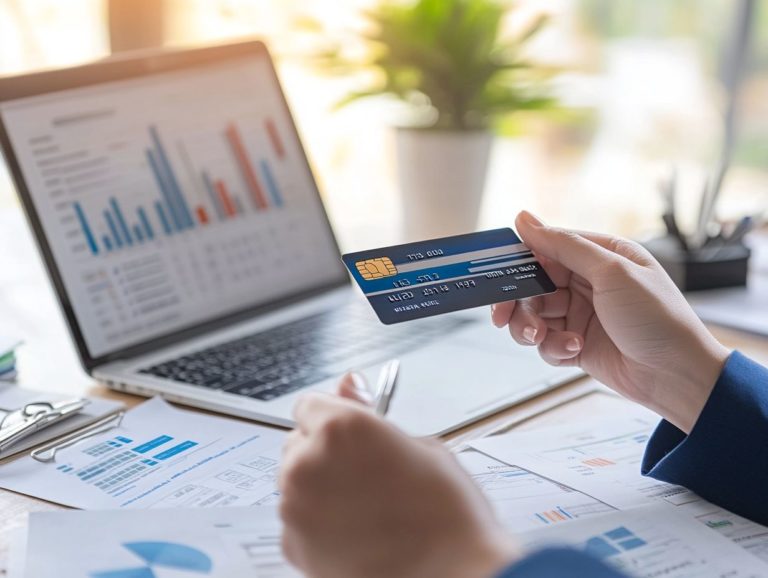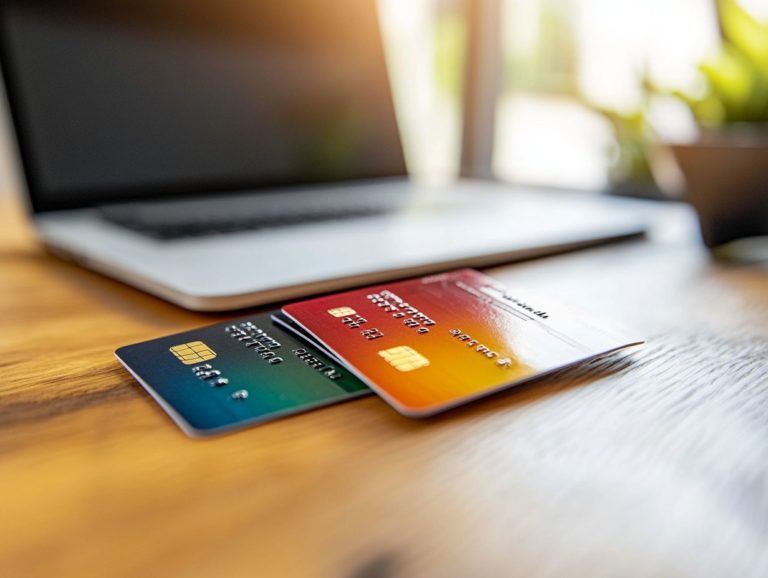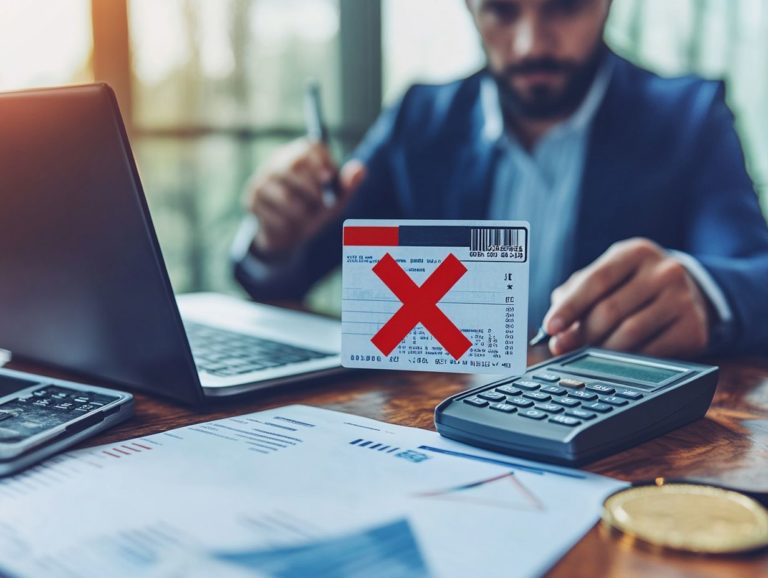Maximizing Tax Deductions with Business Cards
Understanding tax deductions can truly transform your business’s bottom line. This article offers a comprehensive guide to the intricacies of business expenses, with a particular emphasis on how business cards can help you unlock substantial tax deductions.
It covers everything from the requirements for deductibility to effective strategies for maximizing your claims. You will also find valuable tips on keeping your records organized. Plus, insights into other deductible expenses could ease your tax burden even further.
Dive in and discover how to optimize your business spending for maximum benefit!
Contents
- Key Takeaways:
- Understanding Tax Deductions for Business Expenses
- How Business Cards Can Qualify as a Deductible Expense
- Maximizing Tax Deductions with Business Cards
- Keeping Accurate Records for Tax Purposes
- Tips for Using Business Cards to Track Expenses
- Other Ways to Save on Business Expenses
- Frequently Asked Questions
- What are tax deductions for business cards?
- How can business cards be used to maximize tax deductions?
- Can personal expenses for business cards be tax deductible?
- What are some common expenses for business cards that can be tax deductible?
- Are there any restrictions on the amount of tax deductions that can be claimed for business cards?
- What should I do to ensure that my business cards can be deducted from your taxes?
Key Takeaways:
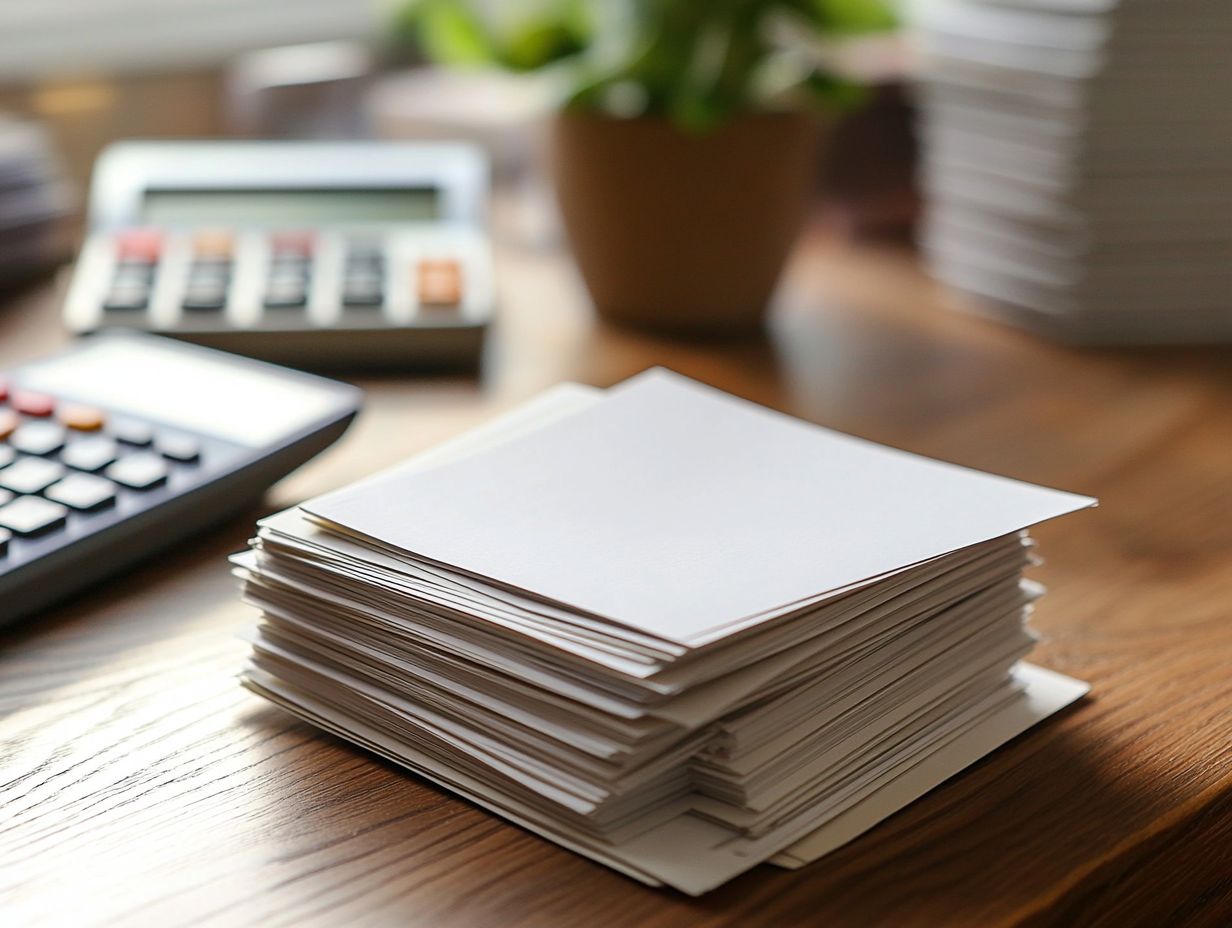
- Know the rules for deducting business cards to maximize your tax benefits.
- Keep accurate records of business expenses, including business card purchases, to support deductions during tax season.
- Utilize business cards to not only track expenses but also to save on other deductible business expenses.
Understanding Tax Deductions for Business Expenses
Understanding tax deductions for business expenses is essential for you as a small business owner seeking to maximize financial growth. These deductions can notably lighten your tax burden.
This enables you to reinvest in your enterprise and boost profitability.
It s vital to familiarize yourself with the IRS guidelines concerning regular business expenses that are needed. This knowledge helps you plan your taxes better and stay compliant.
By skillfully navigating the tax landscape, you can leverage these deductions effectively to support your business objectives.
Overview of Business Expenses and Tax Deductions
An overview of business expenses and tax deductions highlights the importance for you, as a small business owner, to grasp what qualifies as regular business expenses for tax purposes.
Diving into categories like advertising, employee salaries, and office supplies can significantly improve your company s financial health. It can also simplify the tax filing process.
Advertising expenses whether for dynamic online campaigns or traditional print media do more than enhance your brand s visibility; they may also be fully deductible.
Salaries paid to employees represent a considerable investment crucial for attracting and retaining top talent. And when it comes to office supplies, while they may seem trivial at first, those costs can accumulate over time, leading to significant tax deductions.
By managing these expenses wisely, you can foster financial growth while ensuring adherence to tax regulations.
How Business Cards Can Qualify as a Deductible Expense
Business cards can indeed qualify as a deductible expense, providing you with an exciting chance to network while reaping the benefits of valuable tax deductions.
By accurately classifying these costs as integral to your marketing and branding strategy, you can effectively reduce your taxable income while simultaneously investing in your business’s financial growth.
The IRS allows these deductions under the category of ordinary and necessary expenses when utilized for business operations and client interactions.
Requirements for Deducting Business Cards
To deduct business cards as an expense, you need to follow specific IRS requirements that confirm these costs are essential for your business operations. This means the cards should primarily serve a business purpose, like promoting your products, services, or personal brand.
It s crucial to keep proper documentation to back up these expenses. Holding onto receipts, invoices, and a record of how the cards were used can be invaluable when tax season rolls around.
Clearly outlining the context in which you distributed the cards provides necessary justification to the IRS.
Accurate expense records, along with documented usage, will bolster any claims you make on your tax returns. This ensures compliance and maximizes your potential deductions.
Start tracking your expenses now to take full advantage of your deductions!
Maximizing Tax Deductions with Business Cards
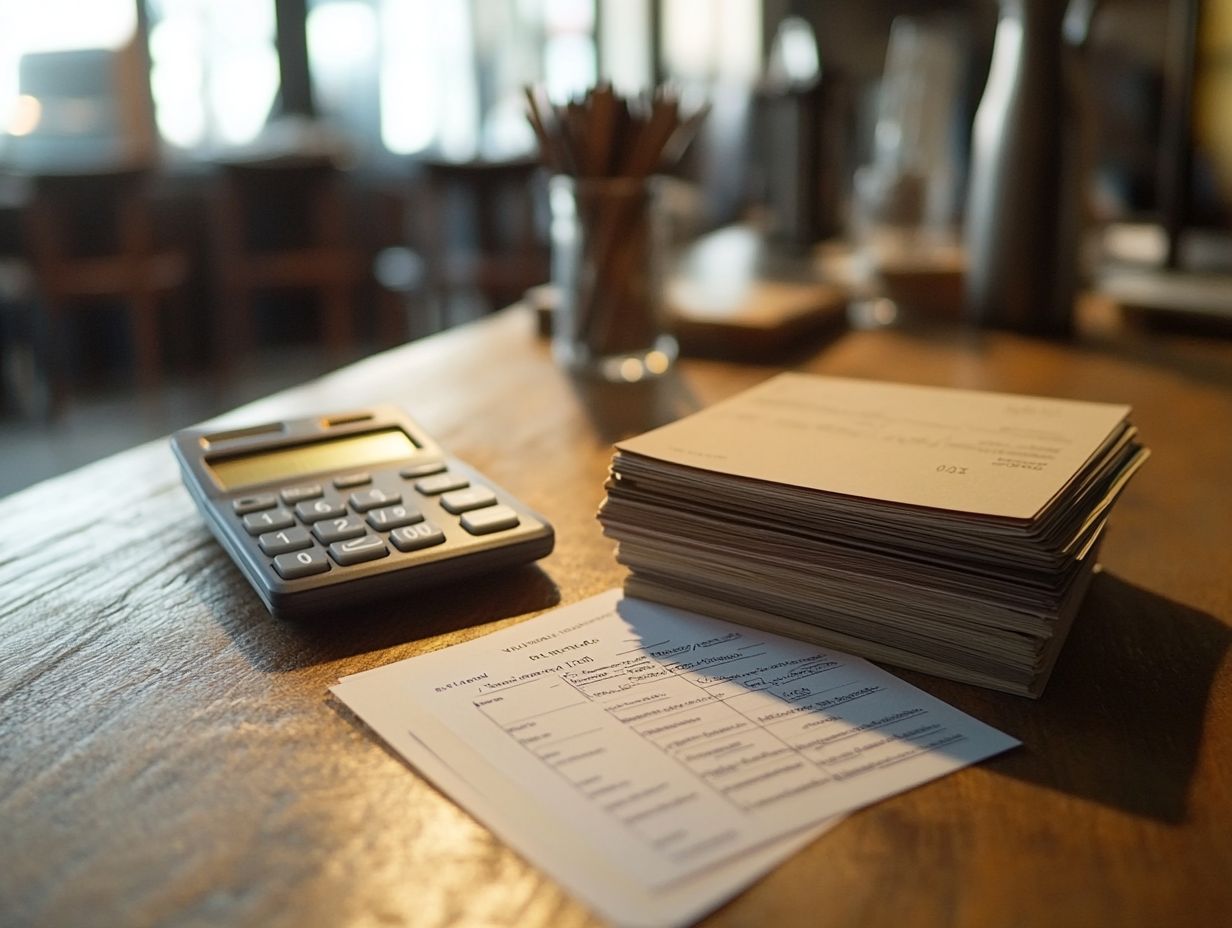
Maximizing tax deductions through the strategic use of business cards is an astute approach for small businesses eager to grow their finances while minimizing taxable income. For more insights, check out the impact of business credit cards on your taxes.
By grasping the intricacies of tax write-offs linked to marketing materials, you can utilize business cards as a vital component of your tax planning strategy. This not only elevates your networking opportunities but also positively impacts your company s financial outlook.
Strategies for Maximizing Deductions
Use effective strategies to maximize tax deductions for your business cards. This can significantly boost your small business’s finances and operational efficiency.
By carefully tracking networking opportunities and linking card usage to your business activities, you can establish a strong foundation for financial planning. Keep organized records of expenses tied to networking events and client meetings, as these can lead to meaningful deductions.
Adopting a systematic approach to documenting your expenses ensures compliance with tax regulations and facilitates smooth audits when necessary. Understanding the important role deductions have can make a remarkable difference in reducing your taxable income and enhancing your business’s bottom line.
Keeping Accurate Records for Tax Purposes
Keeping accurate records is vital! It can save small businesses money and hassle during tax season. Proper records ensure compliance while maximizing potential deductions on various expenses, such as write-offs related to business cards and other marketing materials.
Thoughtful record-keeping supports tax compliance and offers valuable insights into your business’s financial health. This enables you to engage in effective financial planning and identify growth opportunities.
By diligently tracking all relevant expenses, you position yourself to defend your deductions during IRS audits and elevate your overall financial strategy.
What Records to Keep and How to Organize Them
As a small business owner, start by keeping specific records! Track invoices for services rendered, receipts for purchases, and detailed bank statements that document your income and expenditures.
Proper organization of these financial documents streamlines the tax filing process and elevates your overall financial planning. Embrace digital tools like Quaderno, CoinLedger, and Xero to simplify your expense tracking.
These tools help you categorize your spending efficiently and monitor cash flow in real-time. By leveraging technology, you can minimize manual errors and dedicate more time to growing your business, ensuring you have the necessary documentation for audits or financial assessments.
Tips for Using Business Cards to Track Expenses
Utilizing business cards effectively to track expenses offers small businesses a straightforward yet impactful approach to bolster financial growth and simplify tax deductions. By harnessing business cards as a strategic tool for networking and client engagement, you can establish a comprehensive record of expenses that directly supports your business operations.
This technique not only facilitates tax planning but also ensures that every dollar spent is meticulously documented and fully optimized for deductions.
Start tracking your expenses today and watch your savings grow!
Utilizing Business Cards for Expense Tracking
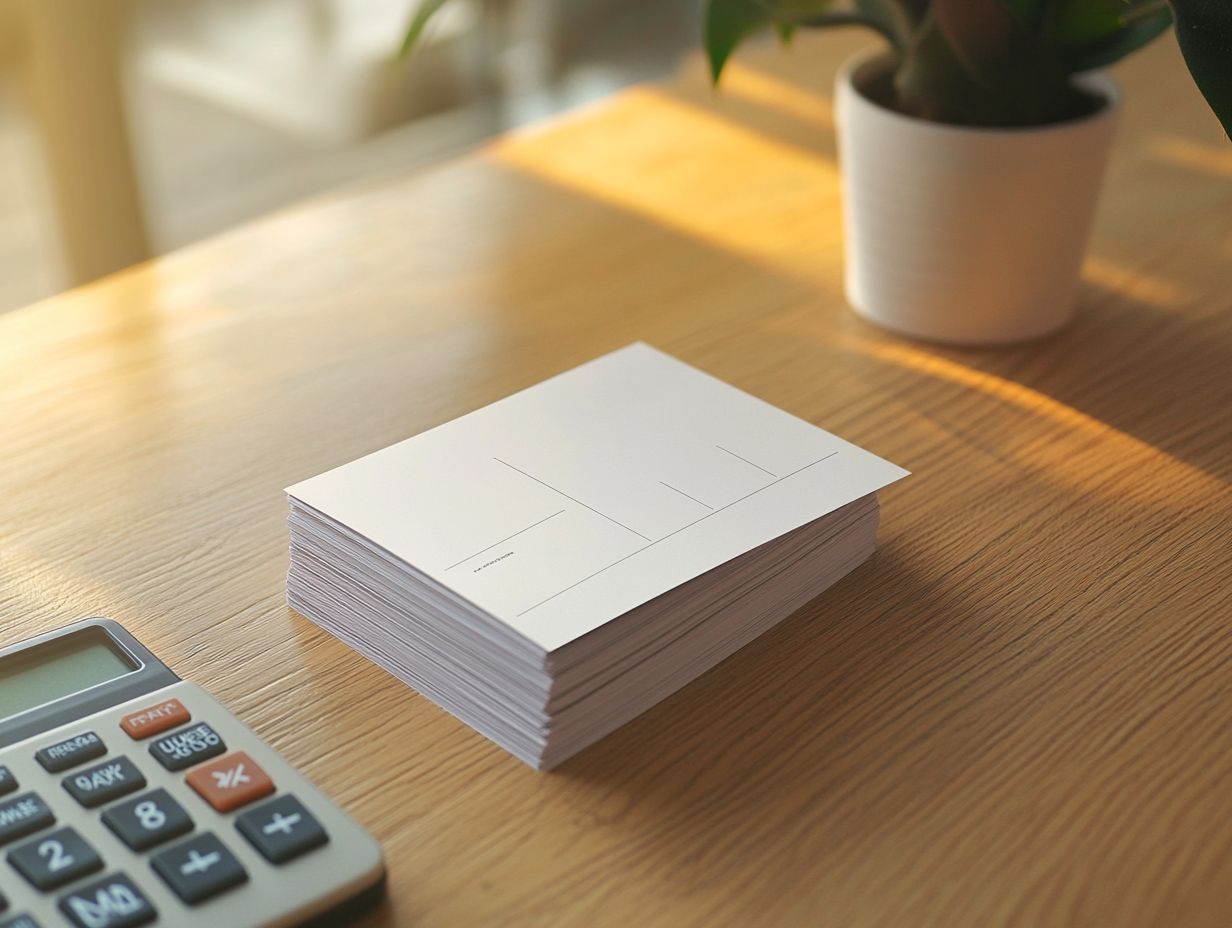
Utilizing business cards for expense tracking can truly revolutionize your small business, enabling you to sustain financial growth while effectively navigating tax deductions.
By integrating business cards into your expense management system, you can associate these cards with specific transactions or networking events, ensuring that no valuable networking opportunity slips through the cracks. This approach streamlines your documentation process. Each expense incurred during business-related activities can be effortlessly traced back to its origin.
Not only does this method keep your finances organized, but it also becomes invaluable during tax season.
With precise record-keeping, you can maximize your deductions, presenting clear evidence of expenses that can notably affect your taxable income. Embracing this strategy is essential for ensuring your financial stability and compliance.
Other Ways to Save on Business Expenses
Exploring alternative avenues to save on business expenses is essential for you as a small business owner aiming to optimize financial growth and fully leverage available tax deductions.
By identifying a range of deductible expenses and implementing strategic cost-saving measures, you can significantly lower your taxable income.
This approach helps you follow tax rules and supports your financial success. It lays the groundwork for sustained financial success.
Additional Deductible Business Expenses
Discovering more deductible business expenses can transform your financial strategy! Identifying additional deductible business expenses can significantly lower your taxable income and contribute to your financial growth.
As you delve into the various types of deductible expenses, you may uncover valuable opportunities for substantial tax savings. For example, the costs associated with advertising to promote your products and services are fully deductible. This not only lightens your tax burden but also allows you to reinvest in your growth strategies.
Consider employee fringe benefits like health insurance and retirement contributions. These perks are not just attractive to your team; they also provide deductions that help decrease your taxable income.
You can also write off expenses related to software and technology, which are crucial for running efficient operations, offering you additional financial relief.
By strategically managing these deductible expenses, you can enhance your profitability and streamline your financial health, paving the way to greater success.
Frequently Asked Questions
What are tax deductions for business cards?
Tax deductions reduce the amount of money you pay in taxes. They include costs related to your business, such as the expenses for purchasing and using business cards for promotional purposes.
How can business cards be used to maximize tax deductions?
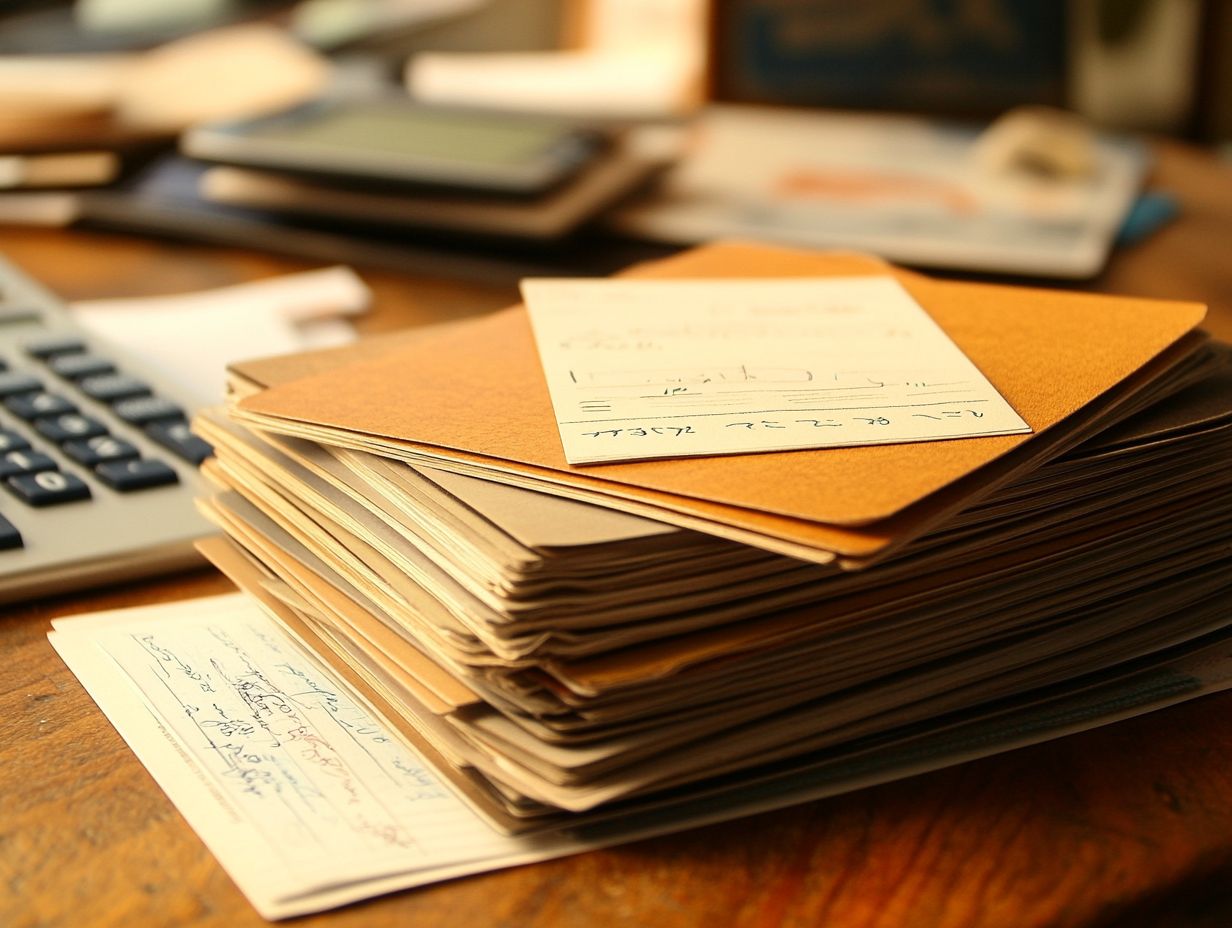
Business cards can be used to maximize tax deductions by ensuring that they are primarily used for business purposes, such as promoting products or services, and keeping track of all business-related expenses associated with them.
Can personal expenses for business cards be tax deductible?
No, personal expenses for business cards are not tax deductible. The expenses must be directly related to the business and used for business purposes in order to be eligible for tax deductions.
What are some common expenses for business cards that can be tax deductible?
Some common expenses for business cards that can be tax deductible include the cost of designing and printing the cards, as well as any other associated fees, such as shipping or postage.
Are there any restrictions on the amount of tax deductions that can be claimed for business cards?
Yes, there are restrictions on the amount of tax deductions that can be claimed for business cards. The total amount claimed must be reasonable and necessary for the business, and any expenses that are considered extravagant or excessive may not be eligible for deductions.
What should I do to ensure that my business cards can be deducted from your taxes?
Want to make your business cards tax deductible? Keep detailed records of all related expenses and ensure you use them mainly for business.
It s a smart move! Consult a tax professional to help you navigate claiming those deductions.


